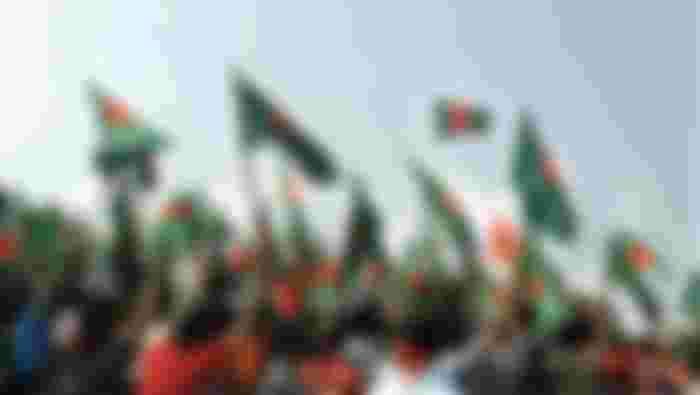
Now it is December. December is the month of victory in Bangladesh. Because on the 18th of this month, the final victory of our freedom struggle was achieved by ending the life of slavery. A separate independent state called Bangladesh emerged. With this occasion in mind, every year we celebrate ‘Victory Day’ on the 16th of December in a grand procession.
Victory Day has become a mechanical lifeless thing in our lives as a result of the long-standing rule that December 16th is celebrated as Victory Day in a few things. On this occasion, the President, Prime Minister and leaders of various political parties gave speeches. Special issues were published in newspapers on this occasion. Discussions and other events are organized by various political and cultural organizations. Every year since 1971, December 16 has been celebrated with these few activities.
It is worth mentioning here that the victory of the independence struggle of Bangladesh on December 16, 1971 and the establishment of an independent independent state called Bangladesh was in fact the second independence for us. We were liberated for the first time in August 1947, after breaking the shackles of British subjugation for two and a half centuries. The name of the political organization through which we gained our first independence in 1947 was the All India Muslim League.
Historians know that the All India Muslim League was born in 1907 in Dhaka on the initiative of Nawab Salimullah. That year the All India Muslim Education Conference was organized in Dhaka on the initiative of Nawab Salimullah. The session was to discuss the possibility of establishing a separate political organization for the Muslims of undivided India through a special political conference with delegates attending that education conference. The then emerging political leader Muhammad Ali Jinnah was also invited to attend the special political session with the delegates present at the education conference. But Muhammad Ali Jinnah rejected the invitation, arguing that the establishment of a separate political organization for Muslims would unjustly hamper the activities of the Indian National Congress for the liberation of the people of the subcontinent.
By refusing to do anything that would hinder the functioning of the National Congress, Muhammad Ali Jinnah then only supported the Congress. As a result, he became the ambassador of Hindu-Muslim reconciliation. It should be noted that Muhammad Ali Jinnah, who considered the establishment of a separate political organization for Muslims undesirable, was later led by Muhammad Ali Jinnah to lead the Muslim League in the movement to establish an independent Muslim state (Pakistan) with Muslim majorities in undivided northwestern and eastern India. With strong leadership, he became popular among the Muslim people as 'Qaede Azam'.
It can be said that it was due to his strong leadership that the Muslim people of the subcontinent were able to establish an independent state called Pakistan in 1947. It may be mentioned here that in the final stage of the anti-British independence struggle in the subcontinent, the two local political parties were seen in full force of the anti-British independence struggle. One is the Indian National Congress, the other is the All India Muslim League. The first demanded that India should be given independence as an undivided, united India. The Muslim League, on the other hand, demanded the end of British rule and the establishment of several separate independent states with Muslim-majority areas in the eastern and northwestern parts of the subcontinent.
The session at which the All India Muslim League adopted this historic resolution was held in Lahore in 1940. The resolution later came to be known as the historic Lahore Resolution. The proposal was made by AK Fazlul Haque, the then popular leader of Bengali Muslims. The word 'Pakistan' was nowhere in the proposal. But the next day the news was published in most of the Hindu newspapers saying 'Pakistan proposal accepted'. The Muslim League also later recognized the establishment of Pakistan as its main goal and their movement for the establishment of an independent state as the Pakistan movement.
With the end of British rule in the subcontinent in August 1947, two independent states emerged. One of them is Pakistan with Muslim-majority areas in the north-west and east of the subcontinent. The rest of the area is Hindu-majority India. Of these, India had no problem with being located in an uninhabited area. But since the two parts of the state of Pakistan are located at a distance of about two thousand miles, the problem between the two parts of the state of Pakistan started from the very beginning of the journey of the state of Pakistan.
There were important reasons for these problems: the state of Pakistan was born and was established in Dhaka in 1906 on the initiative of Nawab Salimullah. Moreover, the Muslim League won only Bengal in 1947 and formed a government under the leadership of Hussain Shaheed Suharwardy to strengthen the hand of Qaeda Azam in demanding Pakistan, which was not possible in any province of present day Pakistan (formerly West Pakistan). For these reasons, Bangladesh had high expectations for an independent Pakistan. But the expectations of the Muslims of East Bengal have not been met. On the contrary, the people of East Pakistan have to embark on their journey as citizens of an independent state amidst a kind of deprivation and despair as the entire defense forces including multiple capitals, army, navy and air force are headquartered in West Pakistan. It is to be noted that the population of East Bengal was the largest in the whole of Pakistan and they were all Bengali speaking. However, a secret conspiracy was hatched to use Urdu as the only state language of Pakistan before any official decision was taken on the state language of Pakistan as most of the high ranking military and civilian officers were non-Bengali Urdu speakers. From the use of Urdu.
It was in this situation that the historic state language movement began in East Pakistan. The state language movement started through the activists of Pakistan movement. Professor Abul Qasim, a young lecturer in the Department of Physics, Dhaka University, took the initiative in this movement. On behalf of the language movement run by a cultural organization called Tamaddun Majlis, the founders, including Professor Qasim, continued their active efforts to strengthen the demand for the state language Bengali by holding frequent discussion meetings with students and teachers at the Dhaka University campus.
Tamaddun Majlis was established on 1 September 1947. In the same year, the first Rashtrabhasha Sangram Parishad was formed by convening Nurul Haque Bhuiyan, a young teacher in the Department of Chemistry at Dhaka University. On 4 January 1947, the East Pakistan Muslim Students League was formed with student leaders supporting the Pakistan movement. Since the establishment of the Muslim Students League, Tamaddun has been actively supporting the language movement initiated by the Majlis.
In the context of the birth of the BCL and its support for the language movement, the Second Rashtrabhasha Sangram Parishad was formed in 1948, where Tamaddun Majlis and Shamsul Alam, a general member of the BCL, were convened. On the initiative of this second Sangram Parishad, a strike was called in the whole of East Pakistan on 11 March 1947 to demand that Bengali be made one of the state languages. The strike was largely successful.
Due to the support of Railway Labor League towards the strike, no train was able to leave Chittagong for Dhaka that day. The strike started from March 11 and continued till March 11, 12, 13, 14 and 15. In such a situation, the then Chief Minister Khwaja Nazimuddin got scared and signed all the demands of the Rashtrabhasha Sangram Parishad and signed an agreement with him. Because, in a few days, the Governor General of Pakistan Quaid-e-Azam Muhammad Ali Jinnah is supposed to come to Dhaka. If he came to Dhaka and saw such chaos, he feared that he did not have a good idea about Khwaja Nazimuddin.
Nazimuddin, who signed the agreement in 1948 complying with all the demands of the State Language Struggle Council, later became the Prime Minister of Pakistan and announced at a public meeting at Paltan Maidan that Urdu would be the only state of Pakistan.
In protest of Nazimuddin's somersault, on 21 February 1952, many language soldiers demanded the state language of Bengal and demanded that Bengal be made the state language with fresh blood. In the Constitution of Pakistan, the proposal to make Bengali and Urdu the state languages was unanimously adopted. After adopting Bengali as the state language, no one dared to oppose it in any way. It is to be noted here that the autonomy movement in the then East Pakistan became stronger along with the state language movement and gradually the sense of independence among the people of this country became stronger. Evidence that this consciousness became strong on the eve of 1971 is matched by the landslide victory of the Awami League in the 1970 general elections.
It is unfortunate that the people of the whole country were able to establish an independent Bangladesh on December 16, 1971 by waging an all-out armed war by conspiring to destroy this consciousness of the people through Tikka Shahi barbarism. That is why December 16 has become immortal in the history of Bangladesh. We have not been able to build our beloved Bangladesh in the right way due to our failure to understand the historical significance of Victory Day.

Today is December 16, the day of great victory. The most glorious day in the life of the Bengali nation is the day of liberation from the shackles of subjugation. People across the country will celebrate the day today with joy and sorrow at the same time. The fearless heroic children who sacrificed their lives for freedom will be remembered with deep sorrow and reverence.
However, due to the coronavirus situation, the health rules will be followed at the national level to celebrate Victory Day. There is no stylish arrangement like other times. Besides, Victory Day parade will not be held.
President on the occasion of the day. Abdul Hamid, Prime Minister Sheikh Hasina and Leader of the Opposition Raushan Ershad have given separate statements. Newspapers will publish special supplements highlighting the significance of the day. On this occasion, electronic media will broadcast various programs based on the liberation war throughout the month.
On this day in 1971, after 9 months of bloody war, the Bengali nation achieved the final victory of the freedom struggle
So in order to make Bangladesh an ideal independent state, we must understand the significance of Victory Day.
Sir@ErdoganTalk @georgedonnelly @MarcDeMesel @molecular@btcfork @sanctuary.the-one-law @Omar@Macronald Please Reed our victory history of Bangladesh..
We Are really proud

